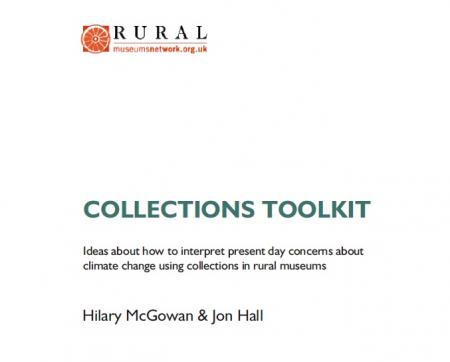ACTIONS
- Protect and safeguard cultural and natural heritage
- Learning and educational opportunities
- Cultural participation/social inclusion
- Sustainable tourism
- Support research
- Employment (recruiting, training, safety)
- Energy consumption, greenhouse gas emissions
- Waste management and reduction
- Transport (forms of, energy use)
- Commercial activities including copyright and IP
- Governance and management
- Security, disaster preparedness, risk reduction
- External partnerships and collaborations
- Publication/report
- Toolkit/framework/roadmap
- Case studies
Collections Toolkit: how to interpret present day concerns about climate change using collections in rural museums

Intended Audience
Museums and museum workers, especially in rural museums.
- H. McGowan and J. Hall, Rural Museums Network
“The toolkit looks at ways of interpreting present day concerns about climate change using objects from the past - collections which may be medieval, 17th, 19th or early 20th century - and gives examples where these can be helpful. These messages can be interpreted through labels in cased displays, interpretation panels both indoors and out, printed and web-based material, costumed interpreters and demonstrations.” (p.2)
Avaiable in
- English
SDGs LINKAGES
The resource can help make use of collections to support Education for Sustainable Development (SDG 4.7), lifestyles in harmony with nature (SDG 12.8) and climate education, awareness and action (SDG 13.3). The resource can also help equip collections professionals with skills to support educational programmes on climate themes (SDG 4.4).
Click on the SDG Target to discover Our Collections Matter indicators
-
Our Collections Matter indicators:
- Number of young people and adults in skills-development activities and programmes drawing on collections, for employment, decent jobs and entrepreneurship.
- Increase in number of young people and adults in such programmes.
- Number and proportion of staff who have received training in the last year, to better support their contribution to the SDGs.
- Programs and processes in place to ensure the availability of a skilled workforce.
-
Our Collections Matter indicators:
- Numbers of people in each type of programme drawing on collections from different demographic groups.
- Increases in numbers of people in each type of programme from different demographic groups.
- Proportion of people involved in such programmes in relation to overall audience size.
- Evidence that learners have acquired knowledge and skills to promote sustainable development.
-
Our Collections Matter indicators:
- Extent to which (i) global citizenship education and (ii) education for sustainable development (including climate change education) are mainstreamed in (a) national education policies; (b) curricula; (c) teacher education; and (d) student assessment.
- Extent to which global citizenship education and education for sustainable development (including climate change education) are mainstreamed in formal, informal and non-formal education programmes and activities drawing on and related to collections.
-
Our Collections Matter indicators:
- Plans in place to enhance positive contributions to addressing climate change through use of collections. Plans in place to ensure collections, collections institutions and broader society can adapt effectively to climate change.
- Plans in place for effective education and awareness raising on climate change mitigation, adaptation, impact reduction and early warning.
- Plans in place to reduce negative contributions of collections-related functions, e.g. measuring greenhouse emissions with plans and targets in place to reduce them.
